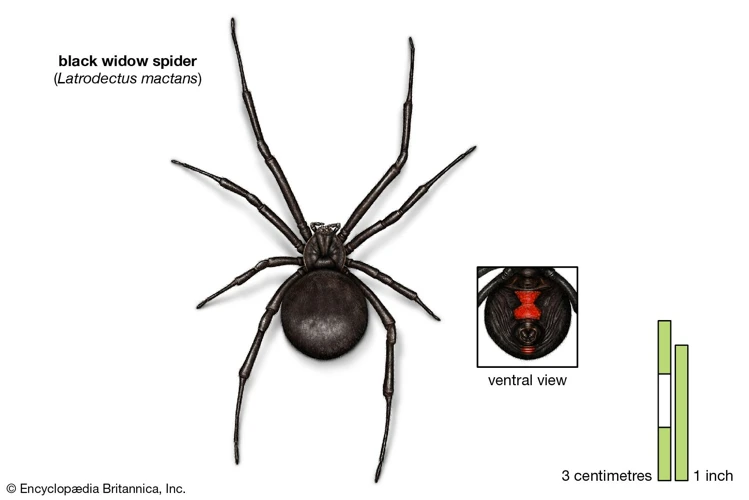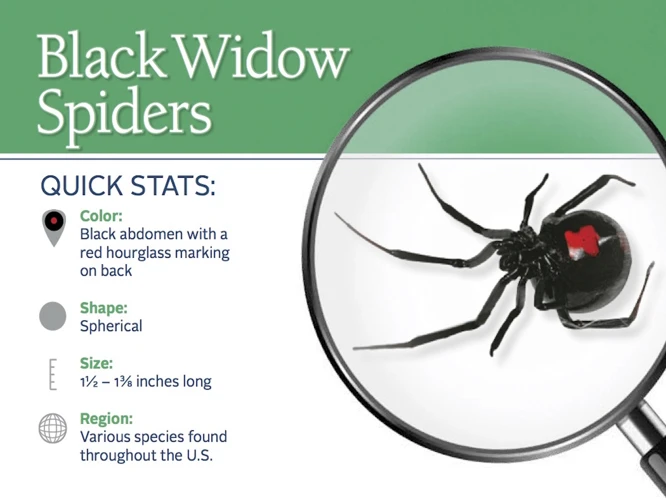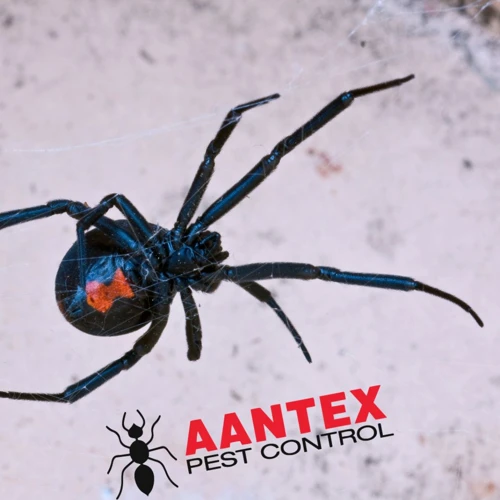Introduction

When it comes to spider bites, the black widow spider is one of the species that people fear the most. With their distinctive black body and red hourglass-shaped markings, these venomous arachnids can be found in many regions of the world, including the United States. While black widow spider bites are rare, they can be incredibly dangerous and potentially deadly, particularly for young children, the elderly, and those with compromised immune systems. In this article, we’ll explore some of the preventative measures that you can take to avoid black widow spider bites both indoors and outdoors, as well as what to do if you are bitten.
Overview of Black Widow Spiders
Black widow spiders are venomous spiders that are native to North and South America. They are most commonly found in warm climates and inhabit a variety of environments, including forests, fields, and urban areas. Black widows are easily recognizable due to their glossy black color and distinctive red hourglass-shaped marking on their abdomen.
Female black widow spiders are considered the most dangerous because they have the potential to deliver a painful and harmful bite, while male black widows are rarely venomous to humans and are considered harmless.
Black widow spider bites are not always immediately noticeable and can be mistaken for other insect bites. However, the bite can cause serious health complications, including muscle pain, cramps, spasms, and in some cases, death. It is important to take proper measures to prevent black widow spider bites and seek medical attention immediately if you suspect you have been bitten.
To learn more about the identification and treatment of black widow spider bites, check out our article on symptoms and treatment of black widow spider bites.
Preventative Measures Indoors

Ensuring that your home is free from black widow spiders is a vital step in protecting yourself and your loved ones from dangerous bites. Although black widow spiders are typically found in outdoor spaces, they may occasionally make their way indoors. Taking preventative measures inside your home can significantly reduce the risk of bites. Below we have outlined several steps you can take to keep black widow spiders at bay. During an infestation, it is essential to remain vigilant about staying safe. If you want to know how to treat black widow bites, click here for more information.
Seal Entry Points
One important step in preventing black widow spider bites is to seal entry points to your home. Black widow spiders can enter your home through small cracks or gaps in walls, windows, or doors, so it is important to take measures to seal these entry points.
To seal these entry points, you can use caulking or weather-stripping. Look for any gaps or cracks around windows, doors, and pipes, and apply caulking to seal them off. You can also use weather-stripping to seal off the gaps around doors and windows.
Additionally, make sure that screens on windows and doors are in good condition, and if not, replace them as soon as possible. This will help to keep black widow spiders and other pests out of your home.
By sealing entry points to your home, you can greatly reduce the risk of encountering black widow spiders indoors. It is important to take preventative measures both indoors and outdoors to protect yourself and your family from these potentially dangerous spiders.
For more information on black widow spider bites and treatment options, including myths surrounding treatment options, visit /black-widow-bite-treatment-myths/. If you do happen to get bit, follow these steps for black widow spider bite treatment and seek medical attention immediately.
Keep Clean and Tidy
Keeping your living space clean and tidy is a crucial step in preventing black widow spider bites. Spiders tend to thrive in dusty and cluttered environments, so keeping your home clean and dust-free can significantly reduce spider populations. Here are some tips for keeping your living space tidy:
- Vacuum Regularly: Vacuum your carpets and floors on a regular basis, paying close attention to corners and hard-to-reach areas. This will help to eliminate spider webs and egg sacs.
- Declutter: Keep your home free from clutter and piles of clothing, books, or other items that spiders can use for shelter.
- Store Clothing Properly: Store clothing and shoes inside sealed plastic containers to prevent spiders from crawling into them.
- Dispose of Garbage Properly: Store your garbage in sealed containers with tight-fitting lids to avoid attracting insects and spiders.
By following these simple tips, you can drastically reduce your risk of encountering black widow spiders indoors. For more information on what to do if you are bitten by a black widow spider, visit our article on black widow spider bite treatment.
Shake Out Clothing and Bedding
One of the most important ways to prevent black widow spider bites is to shake out your clothing and bedding before use. Black widow spiders are renowned for their love of warm, dark places, so they often hide in warm and cozy places such as bedding and clothing. The last thing you want is to unknowingly put on a shirt or pants that is harboring a venomous spider.
To make sure that your clothing and bedding are free of spiders, you should shake them out thoroughly before use. This is especially important if you have been storing your clothes or bedding in a dark place like an attic or basement where black widow spiders are known to live. You can also use a flashlight to check for spiders before shaking out your clothes.
It’s important to note that black widow spiders can also lay their eggs in clothing or bedding, so it’s essential to be thorough when shaking them out. Use a hard surface like a table or a chair to shake it out and make sure you cover all parts of the clothing or bedding.
Remember to focus on the following steps when shaking out your clothing and bedding:
| Step 1: | Choose a hard surface like a table or a chair to shake out your clothing or bedding. |
| Step 2: | Spread out the items you want to shake out on the hard surface. |
| Step 3: | Use a flashlight to check for spiders. |
| Step 4: | Shake each item vigorously to dislodge any spiders or eggs that may be hiding inside. |
| Step 5: | Repeat this process every time you use your clothing or bedding, especially if you haven’t used them in a while. |
By following these steps, you can significantly reduce the chances of being bitten by a black widow spider. However, if you suspect that you have been bitten by a black widow spider, it’s important to seek medical attention immediately. For more information on black widow spider bites, check out our article on Treating Black Widow Spider Bites.
Use Essential Oils
Using essential oils is another preventative measure that can help keep black widow spiders away from your home. There are certain oils that have been found to be effective in repelling spiders, including black widow spiders. These oils include peppermint oil, eucalyptus oil, lavender oil, and citronella oil.
To use essential oils, you can add a few drops of the oil to a spray bottle filled with water and spray the mixture around doors, windows, and other entry points to your home. Alternatively, you can add a few drops of the oil to cotton balls and place them in areas where spiders may be entering, such as under furniture, or in closets and cabinets.
It’s worth noting that while essential oils can be effective as a preventative measure, they are not a guaranteed solution. It’s important to use caution when handling essential oils and to follow recommended dilution guidelines to avoid skin irritation.
If you do encounter a black widow spider bite, essential oils can also be used as a complementary treatment option to help reduce inflammation and promote healing. Oils such as tea tree oil, lavender oil, and frankincense oil have anti-inflammatory properties that can be helpful in reducing swelling and pain. However, it’s important to remember that essential oils should not be used as a substitute for medical treatment. If you are bitten by a black widow spider and experience symptoms such as severe pain, muscle cramps, and nausea, seek medical attention immediately.
Important: Remember that prevention is always better than cure. Keep your home clean and tidy, seal entry points, and use natural solutions like essential oils to help prevent black widow spider bites.
Preventative Measures Outdoors

Taking preventative measures is crucial to avoid being bitten by the dangerous black widow spider. While it is important to take precautions indoors, it is equally important to be vigilant when outdoors. These venomous spiders can be found in outdoor areas that are cluttered and debris-filled. So, before you venture outside, follow these simple yet effective preventative measures to ensure that you stay safe. By doing so, you can reduce the risk of getting bitten by a black widow spider and prevent the serious health complications that can arise from such a bite.
Clear Clutter and Debris
Keeping your outdoor space clutter-free and tidy is essential in preventing black widow spider bites. These spiders are known to thrive in dark, undisturbed areas such as woodpiles, piles of rocks, and debris. By removing these items from your yard, patio, or garden, you reduce the chances of encountering black widows. It’s also important to keep your lawn and bushes trimmed and tidy as black widow spiders can also hide in tall grass and shrubs.
In addition to clearing debris, consider sealing up any cracks or gaps in buildings, outdoor sheds, or garages. This will reduce the chances of black widows entering your home or workspace. If you do store items such as gardening tools or outdoor equipment in a shed, make sure to keep them organized and put them away properly after use.
Regularly check your outdoor items such as shoes, gloves, toys, and furniture. These can serve as hiding spots for black widow spiders. Before using any of these items, it’s important to shake them out as a preventive measure.
If you have a garden or compost pile, be sure to check them regularly as well. Although black widow spiders do not typically inhabit these areas, they do attract other insects that can serve as a food source for the spiders.
Keep in mind that black widow spider bites can be dangerous, and practicing outdoor preventive measures is key to avoiding encounters with these spiders. By clearing clutter and debris and keeping your outdoor areas tidy, you can greatly reduce the chances of encountering black widows.
For more information on what to do if you are bitten by a black widow spider, visit our article on black widow spider bites, including what to avoid when treating a bite, treatment differences for kids and adults, and recovery process after a bite.
Wear Protective Clothing
One of the most effective ways to protect yourself from a black widow spider bite is to wear protective clothing. This not only helps to prevent a bite, but also reduces the chances of them coming into contact with your skin in the first place.
What kind of clothing should you wear? When spending time outdoors in areas where black widow spiders are known to live, it’s important to wear long pants and long-sleeved shirts made of thick, durable material such as denim or leather. This will create a barrier between your skin and the spider, making it more difficult for them to bite you.
If you are planning to go into areas with tall grass or bushes, consider wearing boots that fully cover your feet and ankles instead of sandals or open-toed shoes. You can also tuck your pants into your socks or boots to make it even harder for the spiders to crawl onto your skin.
Additional Measures: It is also a good idea to wear gloves and a hat when working in the garden or cleaning out clutter in crawl spaces, basements, or attics. The gloves will shield your hands, while the hat prevents the spiders from building nests in your hair or crawling onto your scalp.
| Protective Clothing Tips | |
|---|---|
| 1. | Wear long pants and long-sleeved shirts made of thick, durable material such as denim or leather. |
| 2. | Consider wearing boots that fully cover your feet and ankles. |
| 3. | Wear gloves and a hat when working in the garden or cleaning out cluttered areas. |
By following these preventative measures and wearing protective clothing, you can significantly reduce your chances of getting bitten by a black widow spider. However, if you do get bitten, it’s important to seek medical attention immediately. There are also measures you can take to help reduce the symptoms of a black widow spider bite, such as using a compression wrap like PRO-Compress.
Use Insect Repellent
When spending time outdoors, using insect repellent is a great way to prevent black widow spider bites. There are many repellents on the market that can effectively keep black widow spiders and other insects at bay. Look for a repellent that contains DEET, picaridin, or IR3535, as these active ingredients are known to be effective against spiders.
To effectively use insect repellent:
- Read and follow the instructions on the label carefully
- Apply directly to exposed skin and clothing
- Reapply as directed by the product label (usually every few hours)
- Wash repellent off when finished spending time outdoors
It’s important to note that insect repellent should not be applied to wounds, cuts, or irritated skin. Additionally, be cautious when applying repellent to children and avoid applying to their hands, as they may touch their face or mouth. Using insect repellent is just one of many preventative measures you can take to avoid black widow spider bites.
What to Do If You are Bitten
You’ve done everything right by taking preventative measures against black widow spider bites, but accidents can still happen. In the event that you do get bitten, it’s important to know what steps to take. Black widow spider bites can be serious and even life-threatening if not treated promptly. It’s crucial to act fast and seek medical attention as soon as possible. In this section, we’ll cover the steps you should take if you are bitten by a black widow spider, from identifying the bite to administering first aid. Stay calm and read on to learn how to handle a black widow spider bite.
Identifying Black Widow Spider Bites
Identifying a black widow spider bite can be difficult, as the bite itself can often be painless and the symptoms may not appear immediately. However, there are some signs that you may have been bitten by a black widow spider.
Here are some key indicators to look out for if you suspect you have been bitten by a black widow spider:
- Pain: You may experience pain at the site of the bite, which can spread to other parts of the body.
- Redness and Swelling: The area around the bite may become red, swollen, and itchy.
- Muscle Cramps: As the venom spreads through your body, you may experience muscle cramps, particularly in your abdomen and back.
- Sweating: You may begin to sweat profusely, even in cool temperatures.
- Nausea: Some people may experience nausea or vomiting as a result of a black widow spider bite.
- Difficulty Breathing: In severe cases, a black widow spider bite can cause difficulty breathing, chest pain, and even paralysis.
It is important to note that these symptoms can also be signs of other medical conditions, so it is important to seek medical attention if you suspect that you have been bitten by a black widow spider or are experiencing any of these symptoms.
Remember, prevention is key when it comes to black widow spider bites. By taking the necessary preventative measures indoors and outdoors, you can greatly reduce your risk of being bitten. And if you do suspect that you have been bitten, seek medical attention immediately to ensure a prompt and effective treatment.
Seek Medical Attention Immediately
It is imperative to seek medical attention immediately if you suspect that you have been bitten by a black widow spider. The venom of a black widow spider contains neurotoxins that can lead to serious complications if left untreated. In some cases, these complications can even be fatal.
Symptoms of a black widow spider bite can include muscle cramps, sweating, nausea, vomiting, high blood pressure, rapid heart rate, and difficulty breathing. These symptoms can begin within minutes of being bitten and can escalate quickly.
It is important to call emergency services or go to the nearest emergency room as soon as possible. Time is of the essence and prompt medical care can make a huge difference in the outcome of the bite.
At the hospital, the medical personnel will evaluate the extent of the bite and determine the appropriate treatment plan. Treatment typically involves administering antivenom to counteract the effects of the venom. Other medications may also be given to manage symptoms such as pain and muscle spasms.
It is important to note that not all black widow spider bites require antivenom. The decision to administer antivenom will be based on the severity of the symptoms and the overall health of the patient.
In addition to seeking immediate medical attention, it is also important to monitor the symptoms of the bite as they can worsen over time. It is recommended that you keep the affected area elevated to help prevent the spread of venom throughout the body.
A black widow spider bite is a serious matter that should not be taken lightly. Seek medical attention immediately if you suspect that you have been bitten, and follow the treatment plan prescribed by your healthcare provider. Remember, time is of the essence and prompt action can make all the difference in the outcome.
| What to do if you are bitten by a black widow spider: | What not to do: |
|---|---|
| Call emergency services or go to the nearest emergency room immediately | Don’t try to capture the spider, as this can increase your risk of getting bitten again |
| Monitor symptoms and keep the affected area elevated | Don’t apply ice directly to the wound |
| Follow the treatment plan prescribed by your healthcare provider | Don’t try to suck out the venom with your mouth |
Administer First Aid
If you have been bitten by a black widow spider, the first thing you should do is to administer basic first aid. Here are some essential steps to follow when administering first aid.
- Wash the wound with soap and water: Use mild soap and running water to clean the wound and remove any venom that might be present on the surface. Be sure to clean the wound thoroughly but carefully so as not to cause any further pain or damage.
- Use a cold compress: Applying a cold compress can help reduce swelling and relieve pain. Wrap a few ice cubes in a towel and place the compress over the affected area for about 10 minutes, then remove for another 10 minutes, and repeat.
- Elevate the affected area: Use pillows or a rolled-up towel to elevate the affected area above the level of your heart. This can help reduce swelling and prevent the venom from spreading further.
- Take over-the-counter pain medications: Over-the-counter pain medications like ibuprofen or acetaminophen can help relieve any pain and discomfort you might be feeling. Be sure to follow the recommended dosage guidelines.
- Stay hydrated: Drink plenty of fluids, such as water or sports drinks, to help flush out the venom and keep you hydrated. Avoid alcohol and caffeine as they can cause dehydration and make your symptoms worse.
- Seek medical attention immediately: Although black widow spider bites are rarely fatal, they can be dangerous and require immediate medical attention. If you experience any symptoms, such as muscle pain, cramps, or difficulty breathing, seek emergency medical care as soon as possible.
Remember, prevention is key when it comes to avoiding black widow spider bites. Taking the necessary precautions and following the tips mentioned above can help keep you and your family safe from these venomous spiders.
Conclusion
In conclusion, preventing black widow spider bites should be a top priority for anyone living in areas where these venomous spiders are commonly found. By taking the necessary steps both indoors and outdoors, you can greatly reduce the risk of encountering these dangerous creatures.
Remember to regularly inspect your home and seal any entry points, keep your living space clean and clutter-free, and use natural remedies like essential oils. When venturing outdoors, wear protective clothing and use insect repellent. By being proactive and vigilant, you can greatly reduce the risk of coming into contact with black widow spiders.
However, in the unfortunate event that you do get bitten, it is crucial to properly identify the bite and seek medical attention immediately. Administering first aid can also help alleviate symptoms until professional medical help arrives.
By following these preventative measures and being equipped with the knowledge of how to respond in case of a bite, you can enjoy the outdoors and your living space without the fear of encountering black widow spiders. Stay informed and stay safe.
Frequently Asked Questions
What do Black Widow Spiders look like?
Black Widow Spiders are shiny black with a distinctive red hourglass-shaped marking on their abdomen. Females are typically larger, measuring up to 1.5 inches.
How dangerous are Black Widow Spider bites?
Black Widow Spider bites can be dangerous and potentially deadly, especially for children, the elderly, and those with weakened immune systems. However, bites are rare as these spiders generally try to avoid human contact.
What are the symptoms of a Black Widow Spider bite?
Symptoms can vary, but may include redness, swelling, and a pinprick-like sensation at the bite site. Other symptoms can include muscle pain, cramps, and spasms. More severe symptoms can occur, such as difficulty breathing and seizures.
What is the best way to prevent Black Widow Spider bites?
Preventative measures include keeping your home and outdoor areas clean and free of clutter, sealing entry points, wearing protective clothing, and using insect repellent. Essential oils can also be used as a natural deterrent.
Are Black Widow Spiders nocturnal?
Yes, Black Widow Spiders are most active at night and prefer dark, sheltered areas to hide during the day.
Where are Black Widow Spiders commonly found?
Black Widow Spiders can be found throughout the United States, but are most commonly found in southern and western states.
What should I do if I find a Black Widow Spider in my home?
You can try to remove the spider using a vacuum or by trapping it with a jar and sliding a piece of paper underneath. Alternatively, you can call a pest control professional to safely remove the spider.
Are Black Widow Spiders aggressive?
No, Black Widow Spiders are generally not aggressive towards humans and will only bite if they feel threatened.
Can I treat a Black Widow Spider bite at home?
While there are home remedies for treating Black Widow Spider bites, it is important to seek medical attention immediately as bites can be serious and potentially life-threatening.
How can I safely dispose of a dead Black Widow Spider?
You can use a tissue or paper towel to pick up the spider and dispose of it in a sealed plastic bag in the trash. Alternatively, you can flush the spider down the toilet.






